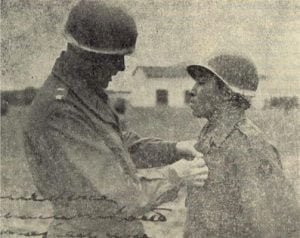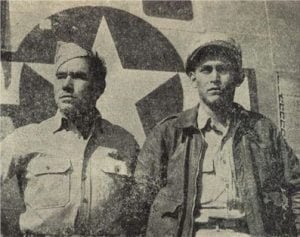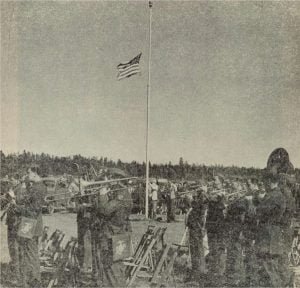
to Pfc. John W. Kionut, Caddo, Oklahoma
The Congress and the state legislatures have passed many low providing various benefits for all veterans except those who have been dishonorably discharged from the armed services. Many of you know what these benefits one; but when you come home you will find at the agency someone who can tell you just how to apply for the benefits which you want, and what you must do to qualify. There is no distinction made between Indians and any other veterans. Every organization serving the veteran will serve you. Your Selective Service Board to which you report within ten days after your return home, will have a counselor to advise; and the State agencies, the Red Cross, and other groups will provide information and counsel. The Indian Service will make every effort to direct you to the proper authority as quickly as possible.
If the first thing in your mind is employment, you probably know that you are entitled to get your old job back, or one with equal pay and standing, provided that you have completed your military service satisfactorily, that you are still able to do the job, that you apply for reinstatement with 90 days of your discharge and that your employer will not suffer undue hardship by taking you back. Once you are on the job, you may not be dismissed without cause for the period of one year. This is true for Civil Service employees and for those in private industry. If you didn’t have a job when you went into the military service, or it you don’t want to go back to the job you left, you should apply to the nearest office of the U.S. Employment Service, or, if you want a Federal job, to the Civil Service Commission. You are entitled to preference for jobs in the Indian Service, both as an Indian and as a veteran, but you must of course qualify by training or by examination.
If you want to continue your education, there are many opportunities. Under the G.I. Bill of Rights (Public Law 346, 78 Congress), you are entitled to one year of school or college, if you have served at least 90 days, not counting the time spent in Army or Navy special training Courses. You many choose the course you prefer at any elementary school, high school, College, or vocational training institute on the list approved by the Veterans’ Administration, but the school you select must accept you as qualified. A number of Indian Service schools have already been added to the approved list, and a number of special courses have been planned for returning servicemen.
If you are under 25, or if you can show that your education was interrupted when you went into military service, you may continue you education beyond this first year. For each month you spent in active service after September 16, 1940, and before the end of the war, you many have an additional month of schooling, tut the total time cannot be more than four years. While you are studying under this program, the Veterans’ Administration will allow you $50 a month for living expenses and will pay your tuition and other fees, including the cost of books, supplies, and equipment, up to $500 per year. If you have dependents, the subsistence allowance will be increased to $75 per month. If you receive payment for work done in connection with your study program, your allowance may be decreased, and if you take only a part-time course, you will not receive the full monthly benefit.

Officer on the right is an Indian from Oklahoma
Commercial courses, courses in agriculture and stock raising, sheet metal work, plumbing, drafting, automotive, mechanics, carpentry, baking, cooking, machine shop work, masonry, painting and decoration, power plant operation, printing and binding, and many others, will be offered at eight or more Indian schools: Albuquerque Boarding School, Carson, Chemawa, Chilocco, Flandreau, Wingate, Haskell Institute and Sherman. Not all of the courses will be available at each school, and other courses will be available to non-Indians, if there is room enough, and the Indian veteran is not limited to a choice of Indian schools. You may take any course for which you can qualify, at any approved school.
If you have a disability resulting from your military service, the educational program offered under Public Law 16, 78th Congress might be more helpful to you. Under this legislation, a disabled veteran may be allowed up to four years of vocational training, during which time he may receive a total pension of not less than $92 per month. If he has dependents, the allowance is larger.
The G.I. Bill also provides readjustment allowances for veterans who are unable to find work. Any unemployed veteran who has served 90 days or more and has been released without dishonorable discharge, or has been disabled in the line of duty, may receive a weekly readjustment allowance of $20, less any part-time wages he may receive in excess of $3. To be eligible for this allowance, the veteran must report regularly to a public employment office; and if he fails to accept any suitable job offered to him, he is disqualified. He may also be disqualified if he does not attend a free training course available to him, or if he has left suitable work, or is discharged for misconduct. The readjustment allowance may be continued for 24 weeks, plus four weeks for each month of active service, up to a maximum of 52 weeks. If he is self-employed and he can show that his net earnings have been less that $100 in the month preceding the date of his application, he is entitled to receive an amount large enough to bring his earnings up to $100 for the month. Benefits under this legislation may not be claimed when five years have passed after the end of the war, and claims must be made within two years after the veteran’s discharge from the military service or within two years after the end of the war, whichever date is later.
Veterans may have free hospital care, medical and dental services, through the Veterans’ Administration, for any disabilities incurred in the line of duty in the service or aggravated because of such service.
The Servicemen’s Readjustment Act of 1944-commonly called the G.I. Bill of Rights also provides for certain benefits for veterans who want to borrow money to buy or build a home, to purchase a farm, farm equipment or livestock, or to acquire business property. The Federal Government will not make loans or extend any credit under this program. It says simply that if you can get a loan for these purposed from any lending agency, either public or private, such as a bank, corporation, or individual, the Veterans’ Administration, on approving the loan, will guarantee one-half of the amounts, up to $2000. The Administrator will also pay the first year’s interest on the amount, which he guarantees. This interest need not be repaid. The loan itself must be repaid according to the conditions under which it is made.

Only Klamath Indian to lose his life in World War II
The lending agency to which you apply for a loan should be one of those serving your community. This organization should understand that you might receive a loan on the same basis as other veterans; even though you may conduct your operations on trust land belonging to you or on tribal lands operated under an assignment. It should be possible for you to get a loan without any security other than a mortgage on the property you are buying with the money loaned to you; but if other security is required, the Superintendent may approve a lien on trust property, other than land, as collateral. Trust land may not be given as security for these loans.
It should also be understood that the Superintendent may authorize a creditor to enter on the reservation to repossess equipment bought with borrowed money, if the loan should be in default.
If you want to qualify for a farm loan, you must show that you have had farming experience. If you loan is for the purchase of livestock, you must show that you have adequate range on which to run it. If you plan to buy farm machinery, you will have to show that you have land upon which the machinery will be used, and you must also describe your plan of operation and demonstrate that it will produce income enough to repay the loan.
In general, no restrictions will be placed upon property obtained under loans guaranteed under the Act, except those, which the lending agency may require in order to protect the loan.
You should remember, too, that you have other ways to obtain a loan, if you are not eligible under the G.I. Bill. The Indian Service may be able to arrange a loan from revolving credit funds; or you tribe may offer to lend you what you need. There are many avenues to explore.
From time to time, Congress may make changes to the provisions of the G.I. Bill and other servicemen’s legislation. Allowances for the unemployed veteran and for the veteran attending school may be increased. You are urged to take advantage of the program which you feel will be most useful to you. Get all the information available, consult with everyone who can be of help to you, and make full use of the opportunities, which you have earned by you service to your country.


